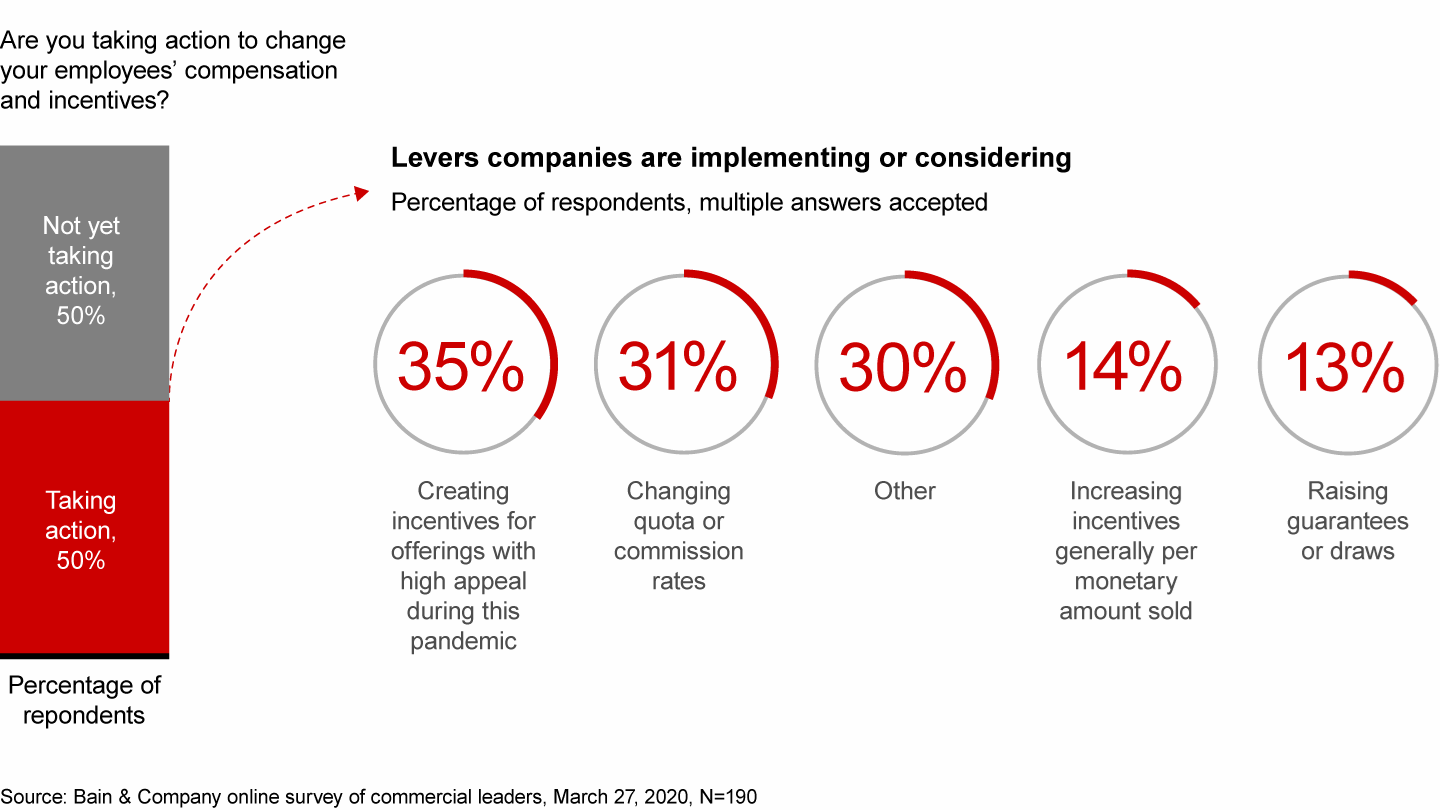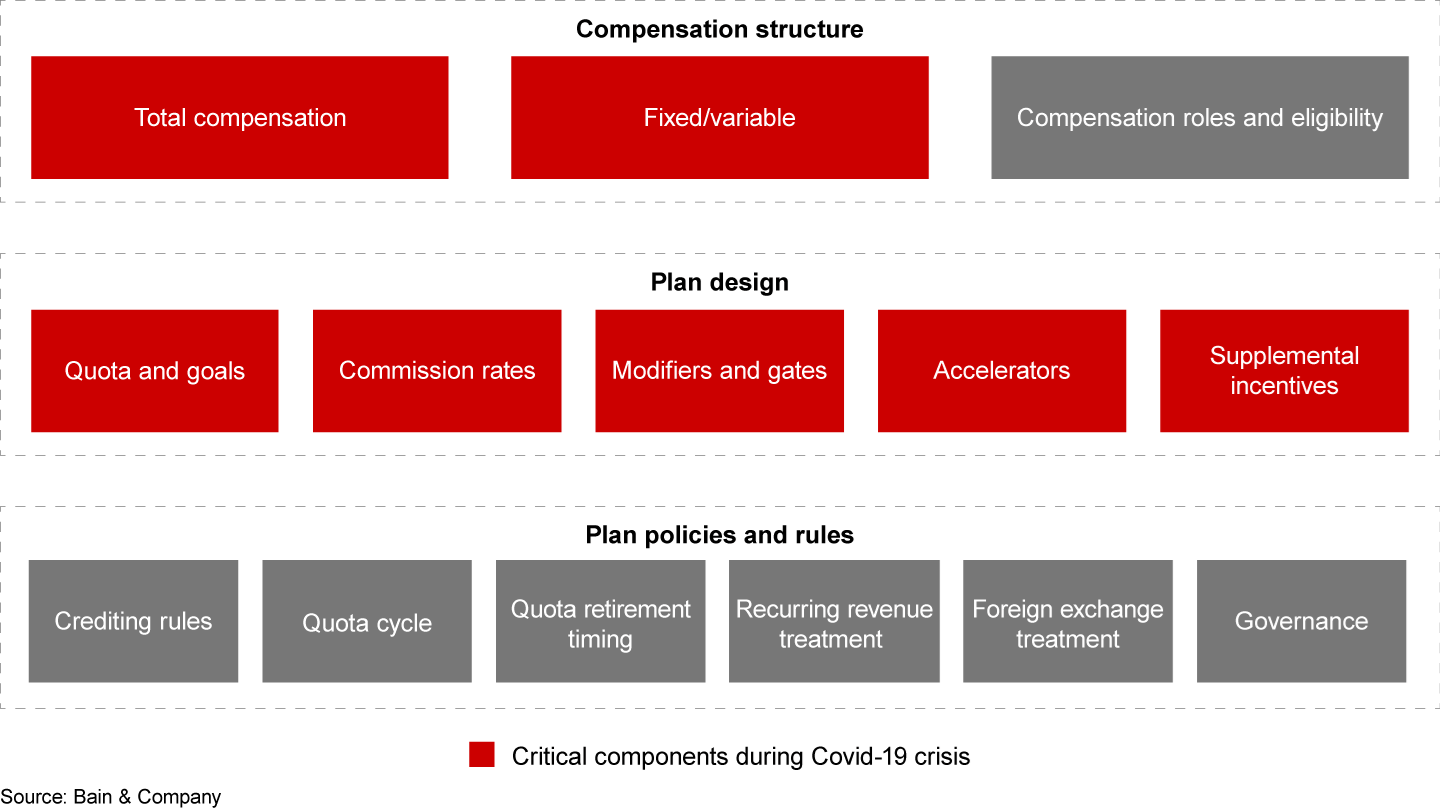Brief

Most companies globally have been scrambling to ensure that their employees are safe in the workplace during the coronavirus pandemic or that they are properly connected online if working from home. Executives recognize the anxiety that many employees feel.
Within sales organizations, however, companies have only begun to explicitly address key concerns for any seller: What will happen to my compensation? Will I lose my job?
Running revenue and cash scenarios provides the foundation for answering these questions. Sales leaders should be transparent with employees in sharing the current assessment of the business, at least at a high level. Providing employees with a view of the executive team’s process for stabilizing the business as well as committing to a schedule for updates are simply table stakes.

Macro Surveillance Platform
For more detail on the business implications of coronavirus from Bain’s Macro Trends Group, log on to the Macro Surveillance Platform. Learn more about the platform >
Commercial leaders also need to weigh changes to sales compensation carefully in the face of uncertainty. Bain & Company recently polled 190 global commercial leaders across business-to-business industries and found that only about half were already changing compensation. Of those, about one-third created incentives to promote offerings with higher appeal during the pandemic, and nearly one-third changed quota or commission rates (see Figure 1).
Only half of sales and commercial organizations have changed compensation schemes due to the economic fallout from the pandemic


They designed these actions not to make sellers whole but rather to mitigate the fallout from Covid-19. Some 13% of companies taking action also were raising compensation guarantees and draws, while 14% were increasing incentives generally.
Moves by leading sales organizations include the following:
- One technology company increased special incentives to motivate account expansion—it’s easier to grow existing relationships than to win new customers.
- A data mining company, seeing slower near-term growth, lowered goals and earnings thresholds and added modest commission increases below 100% attainment to ensure that reps remain motivated.
- An industrial cleaning and hygiene products company is exploring nonmonetary incentives, such as contests and club qualifications, to reward sales of products that are relevant to the Covid-19 pandemic.
- A consumer products company reduced the draw by 20% of a salesforce paid entirely on commission to conserve cash and set expectations of possible further reductions.
- An information services company furloughed its salesforce one day per week.
While no one can predict how long a downturn will last, commercial leaders can benefit from several no-regrets moves:
- Run the revenue sensitivities. Think through how much of the industry risk you can ask your salesforce to bear. Define scenarios, including the once-unthinkable worst case, on what the near-term effects could be as well as the shape and timing of a recovery.
- Define your engagement strategy. How will you communicate with employees, particularly your frontline staff who are hit daily with the harsh realities as well as any opportunities that may be available?
- Determine which compensation levers to pull—and under which scenarios. Every compensation system has a number of components, but a few components matter more right now (see Figure 2). Five questions are most urgent:
- What target compensation will our sellers accept that is consistent with our new budget, revenue plan and headcount plan?
- How are we ensuring that sellers focus on our most relevant value propositions for our most valuable customers? Should we implement new goals, modifiers or incentives?
- Should we make structural changes to retain our most valued sellers? For example, should we change the fixed/variable mix for some roles? Should we raise the draw or minimum given lower demand? Should we reset goals or quotas? Should we change the shape of payouts by lowering the first-dollar threshold, removing caps, changing the slope or lowering the threshold for our highest accelerators?
- How long should we install any changes—the next one or two quarters or the rest of the fiscal year?
- Should changes vary by country or region?
Certain sales compensation components matter more during the pandemic


While this is not the time to reinvent an entire compensation system, commercial leaders should communicate frequently with the front line and absorb what they see and hear from sales staff. Selective changes to compensation can allow sellers to meet their threshold earnings and stay motivated during a period that includes both depressed demand and unexpected surges in demand, depending on the product or service category. Protecting your sales staff—in particular your highest performers—will help to stabilize revenue in the near term and position your company to accelerate growth once the pandemic abates and the economy turns up again.

Coronavirus
The global Covid-19 pandemic has extracted a terrible human toll and spurred sweeping changes in the world economy. Across industries, executives have begun reassessing their strategies and repositioning their companies to thrive now and in the world beyond coronavirus.
Dianne Ledingham and Jordan Lee are partners with Bain & Company’s Customer Strategy & Marketing practice. They are based, respectively, in Boston and San Francisco.